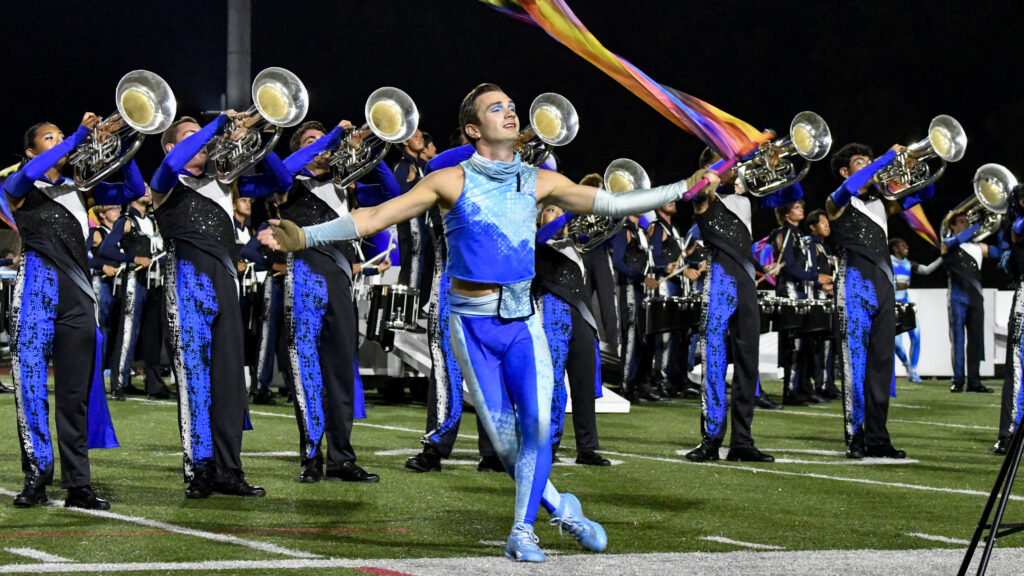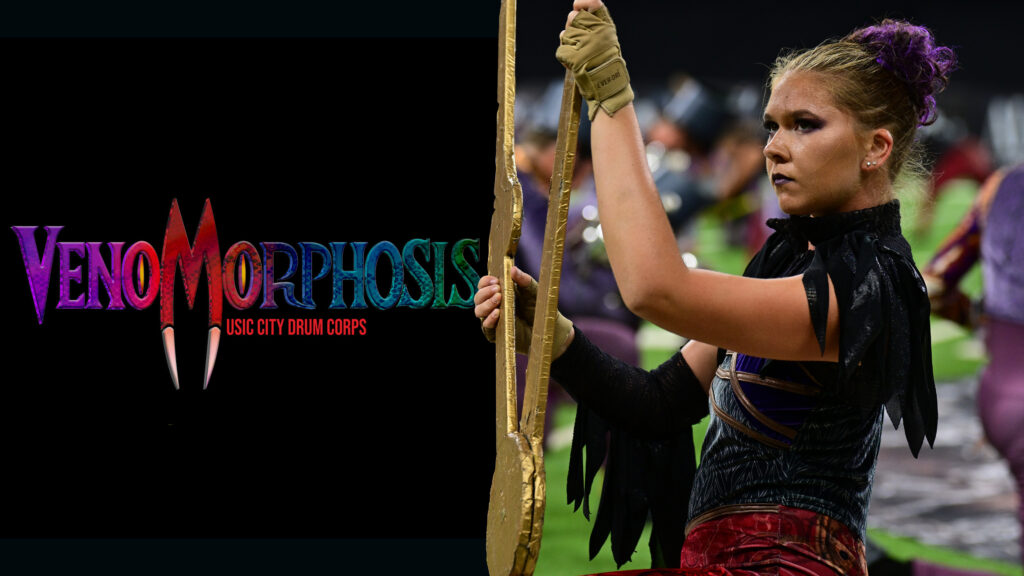The 2004 Drum Corps International World Championship events for Division II & III corps were held at Denver, Colorado’s All City Stadium, the home football field for all Denver Public High Schools.
In what anticipated the coming of DCI’s Open Class division four years later, the top-12 highest scoring corps from both divisions ended their competition with the Division II & III Grand Finals, competing against each other regardless of their respective divisions.
During the performance of Grand Finals performance of East Coast Jazz, the second-to-last corps to compete, an intense and sudden thunderstorm forced corps and fans to run for cover. After it was safe to resume the show, members of the Spartans took to the field to defend their Division II Finals victory over the second-place East Coast Jazz, which the corps had won two days earlier by more than a point.
Of special note in the Grand Finals, Jersey Surf would have finished in seventh place had it not been for a two-point penalty that dropped the corps to 10th place. At the end of their comedic show, the drum major spun a giant roulette wheel to determine the ending. Part of the wheel read “END THE SHOW” and the other part read “TAKE THE PENALTY.” The drum major physically manipulated the wheel to stop on the penalty section, and then members of the corps rushed the stands to finish the show out of bounds, to the screaming delight of the audience.

Spartans’ “Medusa” explored the personality and life of the mythical snake-haired goddess of the underworld and one of the three Gorgons (loosely translated as “dreadful”) who could turn anyone who looked at her to stone.
Composer Key Poulan wrote the original score; at the same time he was also the brass arranger for Santa Clara Vanguard. The segments of the show were titled, “Medusa Lures Poseidon,” “Athena’s Rage,” “Serpents,” and “The Gorgon’s Pursuit.”
“Medusa Lures Poseidon” opened with the color guard members swaying side-to-side while kneeling on the ground, giving them the appearance of the snakes atop Medusa’s head. Ethnic hand percussion instruments offered hints of Middle Eastern music to set the mood for the show.

Athena was considered by ancient Greeks to be the head deity, in charge of wisdom. “Athena’s Rage” highlighted the ruthless fury of Medusa’s antagonist as she directed her uncontrollable anger.
That sense of rage was depicted in the red and yellow flames on the color guard flags. The music was disjointed and dissonant in this section to heighten the drama of the irrepressible anger, with at least a couple melodic hints to “Bacchanale” from Saint-Saëns’ “Sampson and Delilah.”
The next section “Serpents” was based on an Arabic music scale, sometimes referred to as a Byzantine scale. Muted brass solos gave the impression of sounds emanating from a place far away.

The piece started with a single large flag being carried across the field, adorned with long squiggles representing snakes. Triangular banner flags also had snake-like squiggles running the length of the silks, and later, rubber snakes were brought out to convey the flexible nature of the slithering reptiles. The mood was quite restrained, perhaps alluding to Athena’s silent plotting of revenge.
The show ended with “Gorgon’s Pursuit,” a fast and furious piece focusing on the hero Persues’ crafty slaying of Medusa. Perseus, a mortal son of the god Zeus, was a great Greek hero and slayer of monsters. He succeeded in beheading Medusa, which didn’t endear him to the remaining two Gorgon sisters, who in the show were musically portrayed with lime green flags of several squiggles.
The flags metaphorically chased Perseus to extract their own revenge, almost encircling the corps before being pulled off to the side to end in one last snake-like form.

Michael Boo was a member of the Cavaliers from 1975-1977. He wrote about the drum corps activity for more than 35 years while serving as a staff writer for various Drum Corps International projects. During his lifetime Boo wrote for numerous other publications including an honors-winning book on the history of figure skating. He also was an accomplished composer. Boo passed away in 2020 and was inducted into the DCI Hall of Fame posthumously in 2021.





